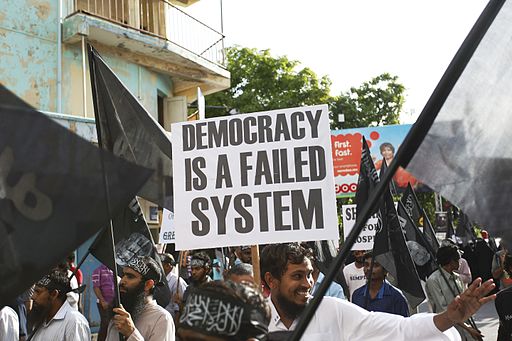8.01.2016
Assigning Responsibility for Religious Extremism
Do religious moderates have any responsibility for the behavior of religious extremists? Many atheists, including this one, would probably answer in the affirmative. Religious moderates provide cover for religious extremists, making it more difficult for the rest of us to critically examine religious beliefs. And even moderate forms of religion glorify superstition and make the willful ignorance of faith into a virtue. When a religious extremist commits an atrocity, religious moderates often rush to the defense of their religion and obscure the fact that the extremists are often doing what their own "holy" books command. And so, I think that many of us would agree that religious moderates might bear at least some responsibility for what the extremists do.
Having said that, I think that reasonable people can and will disagree about how best to assign responsibility in specific cases of religious extremism or other bad behavior by religious persons. Atheists are going to have different opinions, depending on the circumstances involved in the specific case. So let's take a look at a few and see what we think.
How responsible is the average run-of-the-mill Catholic for the fact that some Catholic priests rape young boys? Probably not very much. Not all Catholics rape young boys, and not even all Catholic priests rape young boys. One could argue that the Catholic who raises his or her children to revere the priest has at least some responsibility, but even then, it would be tough to generalize the negative impact of this beyond the increased risk it might pose for that particular child. Even if we are uncomfortable saying the average Catholic has no responsibility at all for the crimes some priests commit against children, my guess is that we'd assign a fairly low degree of responsibility here.
How responsible is the average Catholic for the fact that the Catholic Church has systematically concealed countless incidents of their priests raping young boys? I suspect most of us would agree that the level of responsibility here might be a bit greater. Assuming that the average Catholic knows about this and continues to be a practicing Catholic and/or continues to give money to this criminal organization, we might conclude that he or she has a bit more responsibility here. The more it looks like this Catholic is enabling or defending the church, the more responsibility we'd be likely to assign.
How much responsibility does the average Muslim living in the U.S. have for acts of terrorism committed by Muslims in countries outside the U.S. (e.g., what has been going on in Bangladesh)? Probably not very much. Even if we were to agree that Islam is the single most important factor motivating the atrocities in Bangladesh, it would be tough to argue that the average U.S. Muslim has much responsibility for them. They share a religious faith but little else, and I suspect that the vast majority of U.S. Muslims are quite horrified at the prospect of hacking anyone to death with machetes, including those who have dared to express disagreement with their religion. Then again, I could certainly be wrong about this. One could argue that by defending their faith in light of such atrocities, U.S. Muslims were making efforts to reform Islam more difficult than they might otherwise be. This seems to be a valid point. If U.S. Muslims prevented criticism of Islam and demonized ex-Muslims, this could certainly facilitate continued extremism.
How much responsibility does the average Muslim living in the U.S. have for alleged acts of terrorism committed by U.S. Muslims inside the U.S. (e.g., Orlando). Again, probably not very much but perhaps somewhat more than the situation in Bangladesh. In addition to what was said above about Muslims defending their faith and resisting efforts to reform Islam, the behavior of a domestic Muslim terrorist might raise the question of what sort of interactions such a person had with the Muslim community. Did he or she attend religious services with our average Muslims? Was there evidence of growing radicalization that was dismissed because it was interpreted as a commitment to Islam? I'm not suggesting that average Muslims in the U.S. necessarily deserve more blame here, only that it does not surprise me that they may face some additional scrutiny.
In general, I think we need to be very cautious about blaming moderate religious believers (e.g., Catholics, Muslims) for what one of their extremists does. When we are no longer talking about the actions of a single extremist but a pattern of behavior on the part of several extremists, the calculation may change. And when there is justification for what the extremists keep doing in the "holy" books of the faith, the calculation may change again. And when the moderate religious believers enable the extremists or become obstacles to progress by shutting down criticism of their religion and opposing efforts at reform, we may need to rethink their responsibility altogether.
Assigning Responsibility for Religious Extremism
2016-08-01T05:12:00-05:00
Jack
Christianity
|
Islam
|
